Invited Speakers
ICCCN 2010 will feature the following keynote speakers and distinguished invited speakers.
Keynote Speakers
 |
Monday, August 2, 2010, 8:45 AM - 10:15 AM Paul Francis, Max Planck Institute for Software Systems (MPI-SWS), Germany Title: Privacy in Advertising: Not all Adware is Badware Abstract: Online advertising is a major economic force in the Internet today. Today's deployments, however, increasingly erode user privacy as advertising companies like Google increasingly target users. In this talk, we suggest that it is possible to build an advertising system that fits well into the existing online advertising business model, targets users extremely well, is very private, and scales well. The key to our approach is adware: client computers run a local software agent that profiles the user, requests the appropriate ads, displays the locally, and reports on views and clicks, all while preserving privacy. This talk outlines the system design, discusses its pros and cons, and describes some of our challenges moving ahead. Bio: Paul Francis is a tenured faculty at the Max Planck Institute for Software Systems in Germany. Paul has held research positions at Cornell University, ACIRI, NTT Software Labs, Bellcore,and MITRE, and was Chief Scientist at two Silicon Valley startups. Paul's research centers around routing and addressing problems in the Internet and P2P networks. Paul's innovations include NAT, shared-tree multicast, the first P2P multicast system, the first DHT (as part of landmark routing), and Virtual Aggregation. These days, Paul is wondering why so much of our private data is being held in the cloud. |
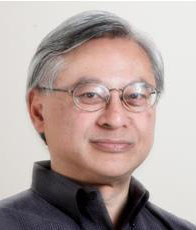 |
Tuesday, August 3, 2010, 9:00 AM - 10:15 AM Vincent Chan, Massachusetts Institute of Technology (MIT), USA Title: Heterogeneous Networks Abstract: Modern heterogeneous networks interconnect fiber, wireless and satellite networks. These communication modalities have very different Physical Layer properties and the interconnection often render traditional Internet Protocols very inefficient or inoperable. The connections occur at all Layers of the network and must accommodate the reality of the heterogeneity of communication modalities and dynamically changing capacities. There are many tough network problems at or near the network edge that are yet to be fully solved. This talk will identify many of the problematic areas that badly need protocol and hardware development. Possible solution techniques will be discussed and research forefront described. Solution techniques will include architectural principles, analysis, algorithmic techniques, and performance analysis/optimization. Our objective is to understand network architecture design from the performance and scalability viewpoint. Our research is aimed towards uncovering networking problems; especially those tied to Physical Layer communication system properties, and explore architecture constructs that may provide realistic solutions for the realization of an integrated heterogeneous network. We particularly concentrate on network management and control, as the most important architecture block of interconnected heterogeneous networks. Bio: Vincent W. S. Chan, the Joan and Irwin Jacobs Professor of EECS, MIT, received his BS(71), MS(71), EE(72), and Ph.D.(74) degrees in EE all from MIT. From 1974 to 1977, he was an assistant professor, EE, at Cornell University. He joined MIT Lincoln Laboratory in 1977 and had been Division Head of the Communications and Information Technology Division until becoming the Director of the Laboratory for Information and Decision Systems (1999–2007). In 2008, he helped formed and is currently a member of the Claude E. Shannon Communication and Network Group at the Research Laboratory of Electronics of MIT. In July 1983, he initiated the Laser Intersatellite Transmission Experiment Program and in 1997, the follow-on GeoLITE Program. In 1989, he formed the All-Optical-Network Consortium among MIT, AT&T and DEC. He also formed and served as PI the Next Generation Internet Consortium, ONRAMP among AT&T, Cabletron, MIT, Nortel and JDS, and a Satellite Networking Research Consortium formed between MIT, Motorola, Teledesic and Globalstar. He has founded in 2009 and is serving as the Editor-in-Chief of a new IEEE/OSA Journal: Journal of Optical Communications and Networking. He has served on the boards and technical advisory boards of many commercial companies and government agencies and is currently a Member of the Corporation of Draper Laboratory and on the Board of Governors of the IEEE Communication Society. He is also an elected member of Eta-Kappa-Nu, Tau-Beta-Pi and Sigma-Xi, the Fellow of the IEEE and the Optical Society of America. Throughout his career, Professor Chan has spent his research focus on communication and networks, particularly on free space and fiber optical communication and networks and satellite communications. His work has led the way to the first successful laser communication demonstration in space and early deployment of WDM optical networks. His recent research emphasis is on heterogeneous (satcom, wireless and fiber) network architectures with stringent performance demands. |
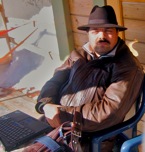 |
Wednesday, August 4, 2010, 9:00 AM - 10:15 AM Kavé Salamatian, Université de Savoie, Polytech-Savoie, France Title: Hey, why should I forward any packets to you? Abstract: The past years have seen the emergence of new scenarios in networks: sensor nets, DTNs, social networks, etc. All these interesting and challenging cases have in common that the traditional forwarding paradigm, that is "store and forward," is not really applicable. We will present in this talk a framework englobing all different forwarding paradigm in the above networks as well as classical networks. In particular, the framework integrates selfish nodes and provides a way to deal with incentives to cooperate in information diffusion in a network. Bio: Kavé Salamatian is a professor at University of Savoie. His main areas of researches are Internet measurement and modeling and networking information theory. He was previously reader at Lancaster University, UK and associate professor at University Pierre et Marie Curie.. Kavé has graduated in 1998 from Paris SUD-Orsay university where he worked on joint source channel coding applied to multimedia transmission over Internet for his Phd. In a former life, he graduated with a MBA, and worked on market floor as a risk analyst and on enjoyed being an urban traffic modeler for some years. He is working these day on figuring out if networking is a science or just a hobby and if it is a science what are its fundamentals. |
Distinguished Invited Speakers
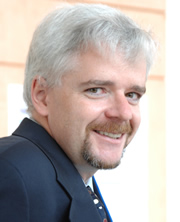 |
Monday, August 2, 2010, 10:45 AM - 12:15 PM Martin Haenggi, University of Notre Dame, USA Title: Analysis and Design of Cognitive Networks: A Geometric View Abstract: This talk conists of three parts. First we discuss the potential and challenges of cognitive wireless networking and dynamic spectrum access. A key issue is interference, which includes self-interference among primary and secondary users and cross-interference from secondary to primary users and vice versa. Managing interference requires explicit modeling of the network geometries. In the second part, we introduce stochastic geometry as a theoretical tool to analyze and manage interference in wireless networks with randomly distributed nodes. In the third part, we apply stochastic geometry to two cognitive scenarios: TV white spaces, and peer-to-peer networking with primary and secondary users Bio: Martin Haenggi is an Associate Professor of Electrical Engineering at the University of Notre Dame. He received the Dipl. Ing. (M.Sc.) and Ph.D. degrees in electrical engineering from the Swiss Federal Institute of Technology in Zurich (ETHZ) in 1995 and 1999, respectively. After a postdoctoral year at the Electronics Research Laboratory at the University of California in Berkeley, he joined the faculty of the electrical engineering department at the University of Notre Dame in January 2001. In 2007-08, he spent a year at the University of California at San Diego on a sabbatical leave. |
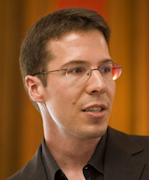 |
Monday, August 2, 2010, 1:30 PM - 3:00 PM Dr. Thomas Dübendorfer, Senior Software Engineer Tech Lead, Google Switzerland GmbH and President, Information Security Society Switzerland (ISSS) Title: Security and Privacy Challenges at Google Scale Abstract: The Internet is facing security challenges on many fronts. An important factor is the use of outdated web browsers with known vulnerabilities. The talk will highlight the extent of insecure web browsers in daily use on a global scale and give reasons why current security update mechanisms don't mitigate the problem adequately. Furthermore, the talk will outline research opportunities for improving Internet security and highlight privacy challenges that Google is facing and explain how we address them with engineering solutions. |
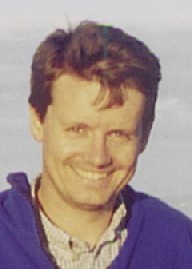 |
Tuesday, August 3, 2010, 10:45 AM - 12:15 PM Patrick Thiran, EPFL, Switzerland Title: Phase Transitions in Wireless Networks and their Consequences Abstract: Like spin glasses in Physics and many other natural systems, wireless multi-hop networks are governed by phase transitions: a small change in one variable (which is here, the transmitting power, or the channel access attempt rate) has a dramatic effect on the properties of the whole network (connectivity, throughput, fairness). We will review two examples of such phase transitions, and discuss their implications on the performance of the network. Bio: Patrick Thiran is an associate professor at EPFL. He received the electrical engineering degree from the Université Catholique de Louvain, Louvain-la-Neuve, Belgium, in 1989, the M.S. degree in electrical engineering from the University of California at Berkeley, USA, in 1990, and the PhD degree from EPFL, Switzerland, in 1996. He became an adjunct professor in 1998, an assistant professor in 2002 and an associate professor in 2006. From 2000 to 2001, he was with Sprint Advanced Technology Labs, Burlingame, CA, and in 2008 with Nokia Research, Helsinki. His research interests include communication networks, performance analysis, dynamical systems and stochastic models. He is currently active in the analysis and design of wireless networks, in distributed signal processing algorithms, and in network sampling and monitoring. He served as an associate editor for the IEEE Transactions on Circuits and Systems in 1997-99, and he is currently an associate editor for the IEEE/ACM Transactions on Networking and of Queuing Systems. He also served on the program committee of different conferences in networking, including Sigcomm, Sigmetrics, Mobihoc and Infocom. He was the recipient of the 1996 EPFL Ph.D. award, and of the 2008 Crédit Suisse Teaching Award. |
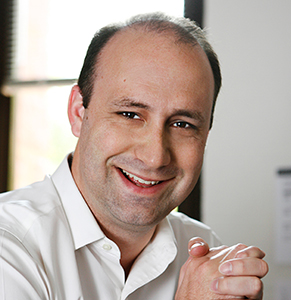 |
Tuesday, August 3, 2010, 1:30 PM - 3:00 PM Patrick Crowley, Washington University in St. Louis, USA Title: High-Speed Networking Mechanisms: Perpetual Challenges & Opportunities Abstract: While popular network protocols are prone to ossification and are, hence, hard to change, the mechanisms used to implement them can be modified and replaced with relative ease, because doing so does not perturb the implicit distributed consensus that communications protocols embody. Indeed, key high-speed networking mechanisms such as longest prefix match, packet classification, pattern search, and others have been replaced and modified through the years in routers, switches, and end-hosts in order to accommodate faster and larger networks. Research in the area represents a source of perpetual challenges and opportunities. This talk will discuss the issues surrounding some important high-speed networking mechanisms, both current and future. Bio: Patrick Crowley is associate professor in the Department of Computer Science and Engineering at Washington University in St. Louis, where he is a member of the Applied Research Laboratory. His research interest is in computer and network systems architecture, with a current focus on A) designing multicore processors and memory systems, B) building fast, programmable network routers with multicore processors, and C) building novel networks that use fast, programmable network routers. He co-founded the ACM/IEEE Symposium on Architectures for Networking and Communications Systems. In 2007, Crowley was chosen to join the DARPA Computer Science Study Group. |
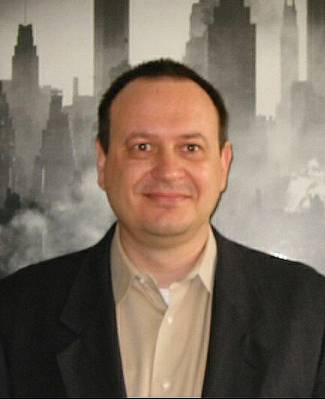 |
Wednesday, August 4, 2010, 10:45 AM - 12:15 PM Rolf Stadler, KTH Royal Institute of Technology, Sweden Title: In-Network Management Abstract: In traditional network management, the "management intelligence" resides outside the network, in management stations and servers, which interact with network elements through protocols such as SNMP. This approach proved successful over the last 20 years, specifically for networks of moderate size whose configuration rarely change and whose states evolve slowly and do not require rapid intervention by an outside system. Such assumptions, however, cease to hold for many of today's networked systems. In this talk, we will introduce the concept of In-Network Management, which involves delegating management functions from outside the network to a self-organizing management plane inside the managed system. We will argue that through decentralization and self-organization, effective management for large-scale, dynamic network environments can be achieved. We will discuss challenges of this approach using examples from real-time monitoring, and we will discuss its potential in the context of current technological developments. Bio: Rolf Stadler is professor at the Royal Institute of Technology (KTH) in Stockholm, Sweden. He holds an M.Sc. degree in mathematics and a Ph.D. in computer science from the University of Zurich. In 1991 he was a researcher at the IBM Zurich Research Laboratory. From 1992 to 1994 he was a visiting scholar at Columbia University in New York, which he joined in 1994 as a research scientist. From 1998 to 1999 he was a visiting professor at ETH Zurich. He joined the faculty of KTH in 2001 and is now at the School of Electrical Engineering, where he leads research in management of networked systems. |